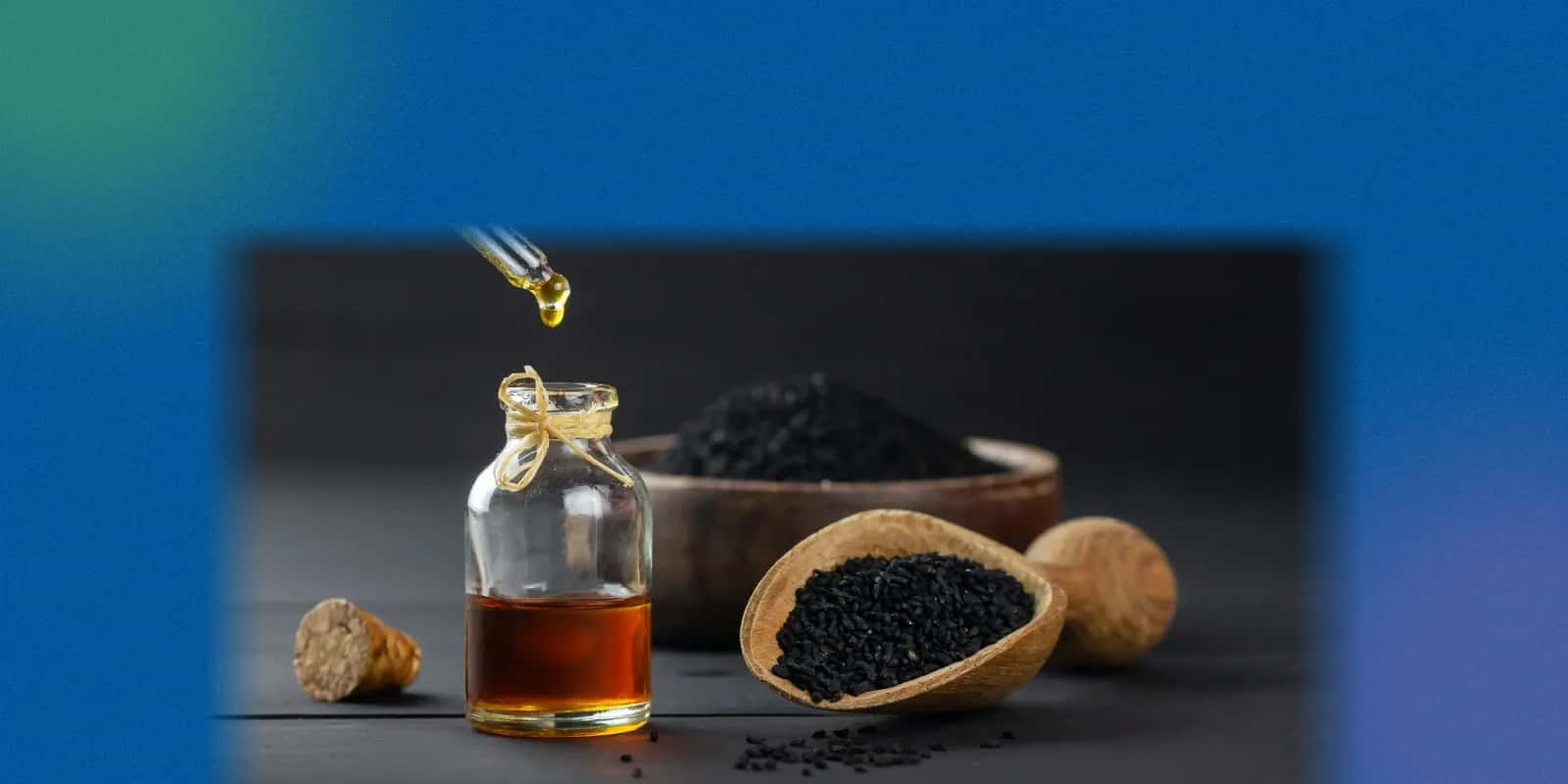9 Impressive Health Benefits of Kalonji Black Seed You Should Know

Introduction
Have you ever seen little black seeds scattered on naan or stored in a spice container at home? Known as kalonji, or black seed, these have been used in Indian, Middle Eastern, and Mediterranean societies for centuries to treat and cook with.
But their uses and benefits are not limited to garnishing. In fact, its uses can be traced back to the history of medicine, dating back to the ancients, as well as Ayurveda and Unani medicine, making it a treasure trove of natural medicine.
This blog explores what kalonji black seeds are, their nutrient profile, benefits, and more.
What is Kalonji Black Seed? Introduction to Nigella Seeds and Their Uses
So what are kalonji seeds? Nigella sativa, commonly known as black onion seeds, kalonji, and kali kalonji in India, is a member of the buttercup family.
These seeds are small, black, and slightly bitter, similar in size to sesame seeds. They add a peppery, nutty flavour to bread, pickles, curries, and chutneys in cooking.
The scope of traditional medicine is broadly inclusive. Called the kalonji seed of blessing in ancient times, the uses of kalonji seeds include improved digestion as well as soothing skin conditions.
There is also a significant interest in testing the medicinal qualities of these seeds in immunology, hormone regulation, and metabolism.
Nutritional Profile and Key Active Compounds in Kalonji Seeds
Kalonji, also known as black onion seeds, are enriched by their nutritious and phytochemical properties. They have fatty acids, proteins, fibre, vitamins B1, B2, B3, folic acid, calcium, iron, copper, and zinc.
The substantial component is thymoquinone, an active ingredient with antioxidant, anti-inflammatory, and anti-bacterial properties. Other beneficial ingredients include alkaloids, flavonoids, saponins, and essential oils. All these nutrients contribute to the health benefits of kalonji seeds.

Top 9 Health Benefits of Kalonji Black Seed
1. Boosts Immunity and Helps Fight Inflammation
The bacteria-fighting properties of kalonji are attributed to its high levels of antioxidants. Thymoquinone is used to reduce oxidative stress and assist the body's defenses. Constant consumption can help enhance resistance against infections and inflammation, such as arthritis.
2. Supports Digestive Health and Reduces Gas
Traditionally, kalonji seeds have been used to help ease bloating, acidity, and indigestion. The carminative effects of these seeds are beneficial in reducing gas and abdominal pain. When used in small doses with a half cup of warm water, they work to aid digestion and bowel movements.
3. Enhances Hair Growth and Improves Hair Health
Kalonji oil/powder can also help eliminate dandruff, strengthen hair roots, and prevent early greying. Regular application has also been associated with thicker and shinier hair; thus, kalonji hair benefits include a reliable natural cure.
4. Benefits Women’s Health and Helps Hormonal Balance
Kalonji also has female health benefits. The seeds are said to maintain hormone balance, regulate menstrual tissues, and ease PMS-related pain. According to some studies, they can even help manage menopausal symptoms.
5. Helps Regulate Blood Sugar Levels
Among the greatest advantages that kalonji has to offer is its ability to regulate blood sugar levels. Studies have shown that kalonji enhances insulin sensitivity and reduces glucose levels, providing a supportive nutritional supplement for individuals with type 2 diabetes.
6. Promotes Respiratory Health and Relieves Asthma Symptoms
In Unani medicine, the kali kalonji is famous for relieving breathing troubles. Warm water with kalonji black seeds can help with breathing and alleviate coughing.

7. Acts as a Natural Antioxidant
Due to their wealth of bioactive compounds, black onion seeds, also known as kalonji, help combat free radicals, prevent aging, and reduce the likelihood of chronic diseases. A daily intake can help prevent cardiovascular disease and maintain overall well-being.
8. Assists in Healthy Weight Management
Weight control is one of the uses of kalonji seeds. Research has indicated that such seeds can suppress appetite and enhance metabolism. They can stimulate fat burning and assist with healthy weight loss when combined with honey in warm water.
9. Improves Skin Health and Supports Healing
Use of kalonji powder or oil topically is associated with healthier, smoother skin. It has antimicrobial properties that help treat acne and antioxidants that aid in wound healing. The seeds also find use in home remedies to reduce scars, pigmentation, and dryness.
How to Use Kalonji Seeds and Powder for Best Results
Safe Ways to Eat Kalonji Seeds Without Side Effects
The typical dosage is a half teaspoon of the product mixed in warm water or honey each day. Excess consumption can lead to nausea. Therefore, consult your doctor if you wish to incorporate kalonji seeds into your diet for the long term.
Common Uses of Kalonji Seeds in Daily Life
Culinary uses of kalonji seeds are extensive. They may be sprinkled into naan, pickles, or herbal teas. Kalonji powder is also used in medicinal forms with honey, oil, or water.
Kalonji Benefits for Hair: Practical Tips for Hair Care
Kalonji oil or paste is beneficial for hair health. To make a natural hair tonic, combine kalonji oil and either coconut or olive oil, and apply it to the scalp. This enhances blood circulation, increases the thickness of roots, and prevents hair fall. To cure dandruff, combine kalonji paste with lemon juice or aloe vera gel.
Common Myths and Facts About Kalonji Black Seeds
-
Myth: What are kalonji black seeds? They are the same as black sesame. Fact: They are Nigella sativa seeds, not related to sesame.
-
Myth: Eating kali kalonji cures all diseases instantly. Fact: While highly beneficial, kalonji works best as a supplement to a healthy lifestyle, not a substitute for medical treatment.
-
Myth: Kalonji benefits for female health are restricted to fertility. Fact: The seeds support broader women’s health, including hormonal balance and menopause relief.

FAQs
Q. What are the main benefits of kalonji black seed?
A. The benefits of kalonji include boosting immunity, supporting digestion, improving hair health, balancing hormones, and regulating blood sugar. Rich in antioxidants, kalonji black seed also aids weight management, promotes respiratory wellness, and helps heal skin naturally, making it highly valued.
Q. How do I eat kalonji seeds for the best health results?
A. Wondering how to eat kalonji seeds? You can consume them raw, add them to warm water, mix with honey, or sprinkle them over bread and curries. Moderate use enhances health benefits while avoiding unwanted side effects.
Q. Can kalonji help with hair growth and hair health?
A. Yes. Kalonji benefits for hair include stimulating growth, reducing hair fall, and nourishing the scalp. Applying kalonji oil or mixing kalonji powder with carrier oils helps strengthen roots, restore shine, and treat dandruff, making the benefits of kalonji for hair widely recognized.
Q. What are the benefits of kalonji seeds for women?
A. The kalonji benefits for female wellness include aiding hormonal balance, supporting fertility, and alleviating menstrual symptoms. It may reduce inflammation, ease fatigue, and improve overall vitality, making it an excellent natural support for women’s health when consumed regularly in moderate amounts.
Q. Is kalonji black seed good for digestive health?
A. Yes. Kalonji seeds are used for digestion by reducing gas, bloating, and constipation. Rich in fibre and active compounds, kalonji black onion seeds improve gut function, promote healthy bowel movements, and may relieve acidity when taken appropriately.
Q. How can I use kalonji powder in my daily routine?
A. You can add kalonji powder to warm water, herbal tea, or honey to boost your immunity. It can also be mixed into hair oils or face packs. Regular use ensures you enjoy multiple benefits of kalonji seeds naturally.
Q. Are there any side effects of eating kalonji seeds?
A. Excessive intake of kali kalonji may cause nausea, low blood pressure, or allergic reactions. While kalonji black seed is generally safe, pregnant women and those taking medications should consult a doctor before adding it to their diet or using it in remedies.
Q. What is the difference between kalonji and black onion seeds?
A. There is no difference; both terms refer to kalonji black seed or black onion seeds, scientifically known as Nigella sativa. They are often confused with onion seeds but are distinct, offering unique medicinal and culinary benefits worldwide.

6 Emerging Benefits and Uses of Ajwain (Carom Seeds) You Should Know

Are Sunflower Seeds Good for You? Nutrition, Benefits, and Planting Guide

Flaxseed (Linseed): Nutrition Facts, Health Benefits & Uses

Hidden Power of Date Seed Powder

Sabja Seeds vs Chia Seeds


